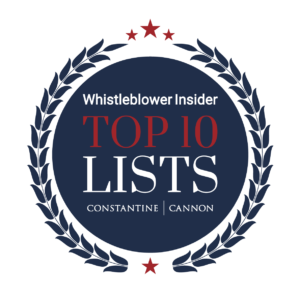Top Ten Financial and Healthcare Fraud Prison Sentences of 2020

Individuals involved in financial and healthcare fraud schemes face not just civil liability, but also criminal penalties – including prison time. In 2020, the Department of Justice obtained substantial prison sentences in a myriad of cases involving healthcare and financial frauds, many of which involved convictions of the type of fraudulent schemes that whistleblowers report. Whistleblowers play an essential role in exposing fraud and bringing information to the government that can result in recoveries for taxpayers and injured parties, as well as criminal investigations and sentencing.
Below are the top 10 prison sentences we found notable in 2020 in cases involving financial & investment fraud or healthcare and pharmaceutical fraud. Each description has links with more information about each of the cases and the types of fraud schemes that resulted in the prison sentences.
- Hal H. Brown Jr., of North Carolina, was sentenced to 17.5 years in prison and ordered to pay $17 million in restitution for defrauding at least 60 victims through his company Oodles, Inc. Through a ponzi scheme, Brown misrepresented that Oodles owned hundreds of millions of dollars in intellectual property rights to religious themed family shows and movies. As part of his financial and investment fraud, Brown lied repeatedly to victims about the impending sale of intellectual property to well-known media companies, and developed marketing material to seek additional investments and loans for Oodles. To convince victims his scheme was legitimate and to appease investors, Brown provided fraudulent statements and misleading information to con his victims – including family, friends, neighbors, and fellow churchgoers – of their life savings set aside for education and retirement.
- William Andrew Hightower, former president of Hightower Capital Group was sentenced to nearly 16 years in prison and ordered to pay $9.6 million in restitution for operating a ponzi scheme that drained the life savings of his clients, most of whom were referred from other investors, family and friends. Hightower mislead investors by presenting his investment programs as successful with high returns in a short period of time. He also would occasionally make monthly payments to investors leading some to re-invest additional funds on the assumption that their money was properly invested. In reality, Hightower was using investor funds to repay other investors, pay his credit cards, and fund his company and lavish lifestyle.
- Jason Galanis was sentenced to nearly 16 years in prison after he pled guilty to his role in multiple securities fraud schemes, and specifically for his involvement in manipulating the market for Gerova Financial Group, Ltd. Galanis and his codefendants engaged in market manipulation and defrauded the shareholders of Gerova, a publicly traded company listed on the New York Stock Exchange, as well as clients of an investment advisory firm. He also defrauded a Native American tribal entity, stealing a large portion of tribal bonds issued by the Wakpamni Lake Community Corporation whose proceeds were intended to fund economic development projects. Instead of turning over proceeds of these tribal bonds to a specified investment manager, Galanis misappropriated the funds for their own personal use.
- Former registered investment advisor, Steven Pagartanis, was sentenced to over 14 years in prison and ordered to pay $6.5 million for his role in orchestrating an 18-year fraud that he plead guilty to in 2018. Pagartanis solicited victims, nearly all of whom were elderly women, to invest in two publicly traded companies on the promise of 8% returns. He laundered the victims’ investments through bank accounts and used the funds to support his luxury lifestyle and fund failed business ventures. Pagartanis’ victims invested over $13 million and sustained losses over $9 million, which included substantial losses in funds set aside for family medical expenses.
- The first healthcare fraud on the list, Aleksander Pikus, the former manager of medical clinics on Brooklyn and Queens, was sentenced to 13 years in prison, ordered to pay $39.4 million in restitution and forfeit $2.6 million after he was convicted for engaging in a kickback and tax avoidance scheme involving medical clinics in Brooklyn and Queens. Pikus, a Brooklyn, New York resident, lead the effort to steal and conceal tens of millions of dollars from the Medicare and Medicaid programs and perpetrated the scheme with his co-conspirators over the better part of a decade. In return for illegal kickbacks, Pikus referred patients to health care providers who submitted claims to the Medicare and Medicaid programs. Pikus and his co-conspirators then laundered the proceeds of these claims through companies he controlled and failed to report the cash income to the IRS. More than 25 other individuals, including physicians, have plead guilty to or been convicted of participating in the scheme.
- Michael Allen Worley was sentenced to 12 years in prison and ordered to pay $15.7 million in restitution to his victims following his guilty plea on chargesdulent loan applications on behalf of himself and business he owned, operated, or controlled. Between 2014 and 2018, Worley obtained over $27 million from federally insured banks in Baton Rouge and around the country, and an ad including bank fraud and wire fraud. Worley admitted to executing schemes to defraud banks and private equity firms by submitting multiple false and frauditional $13 million from private equity firms in Louisiana and Texas, through materially false and fraudulent statements and representations. Worley perpetuated his schemes by inflating his assets, understating and omitting his liabilities, and misrepresenting his income, among other misrepresentations. Worley and his businesses also defaulted on loans causing over $15 million in financial losses to the financial institutions and private equity funds.
- Glenn Doyle Beach and Hope Thomley, pharmacists and co-owners of Advantage Pharmacy in Mississippi, were each sentenced to over 12 years in prison and ordered to pay between $9 million and $29 million in civil monetary judgment, and between $185 million and $189 million in restitution for committing healthcare fraud. Beach and Thomley conspired to fraudulently dispense, distribute, and market compounded medications through Advantage pharmacy and a distributor owned and operated by Thomley. Beach formulated and mass-produced compounded medications to increase reimbursements paid by health care benefit programs, including TRICARE, without regard to individual patient needs. Thomley forged prescriptions and unlawfully recruited beneficiaries. From 2012 through 2016, health care benefit programs, including TRICARE, reimbursed Advantage Pharmacy at least $200 million. In addition to the healthcare fraud scheme, Beach and Thomley were sentenced to their roles in a money laundering and tax evasion scheme. Thomley’s husband, Randy Thomley, was also sentenced to eight years for his actions in recruiting TRICARE beneficiaries and paying them a percentage of the revenue from each prescription to induce them to accept millions of dollars of compounded medications.
- Former Ameriprize financial advisor, Li Lin Hsu (Yilin Hsu Lee), was sentenced to 11 years in prison and ordered to pay $5.3 million in restitution to the victims of her ponzi scheme. Hsu defrauded 20 of her clients – including relatives – out of more than $8.1 million between February 2014 and May 2018. Hsu gained the trust of her victims by engaging with the Chinese Community in Southern California and convincing them that she would safely invest their money as a financial investor at Ameriprise Financial, Inc. After Ameriprise discovered her misconduct and fired her, Hsu founded American Capital Trading Group LLC and American Capital Republic, Inc., where she sought out and defrauded additional investors. Instead, Hsu used investor funds to supplement her lifestyle and purchase homes and luxury goods. Hsu repeatedly lied under oath to the Securities and Exchange Commission and encouraged her victims to lie to the FBI on her behalf.
- Matthew Harrel was sentenced to 11 years in prison and ordered to pay $2.5 million in restitution for his role in organizing a $2 million multi-state Medicaid fraud scheme. Harrell stole Medicaid funds from Georgia, Louisiana, and Florida and continued his fraud schemes even after he was released on bond. Harrel directed his employees to conceal his schemes by creating false documents to support his fraudulent Medicaid billing and fraudulently used Medicaid provider numbers of mental health service providers. Furthermore, Harrell and his co-conspirators stole Medicaid members numbers from children’s summer and football camp registrations, from children placed in foster care, and from stolen government a document containing the numbers of 13,000 Louisiana Temporary Assistance for Needy Families recipients.
- Texas resident Senthil Kumar Ramamurthy was sentenced to 10 years in prison for participating in pharmaceutical fraud schemes that amounted to $9.6 million in losses by Medicare and TRICARE. Ramamurthy and his co-conspirators targeted TRICARE, a health care program for the U.S. military that pays the health care costs of active and retired military personnel and their families, including the costs of medically necessary prescription medications, for 10 months starting in 2014. Ramamurthy and his co-conspirators convinced TRICARE beneficiaries to sign up for compounded prescription medications that beneficiaries did not need by falsely telling beneficiaries that pharmacies would customize their medications or that the medications were free. As a result, compounding pharmacies paid Ramamurthy millions of dollars in kickbacks in exchange for the compounded prescription orders. Ramamurthy then turned his focus to Medicare and paid kickbacks to doctors who referred Medicare beneficiaries to a lab in Georgia for cancer genetic screening tests, without examining the beneficiaries.

Annual Whistleblower Insider Top Ten Lists
Every January, Whistleblower Insider looks back at the significant government enforcement actions of the past year. Our Top Ten lists highlight the biggest recoveries and significant enforcement efforts by different government actors in cases of interest to whistleblowers.
Browse Top 10 Lists
Read More:
- Financial & Investment Fraud
- Healthcare & Pharmaceutical Fraud
- Whistleblower FAQs
- The Constantine Cannon Whistleblower Team
- Contact us for a confidential consultation
Tagged in: Compounding Pharmacy Fraud, Criminal Proceedings, Financial and Investment Fraud, Healthcare Fraud, Pharma Fraud, Ponzi Schemes, Top 10,